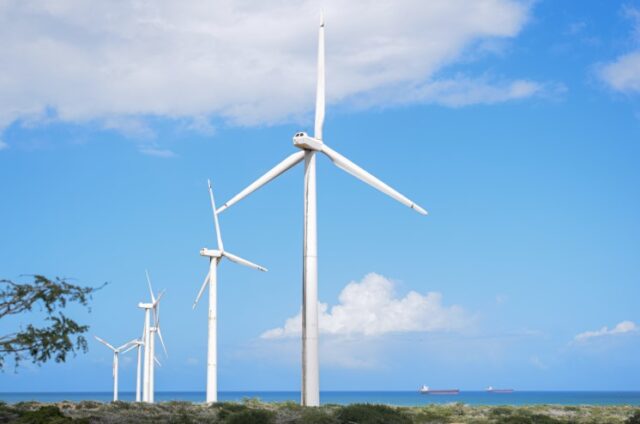In an isolated, arid town at the northern tip of Colombia, onshore wind farms line the coastline. For the residents of the La Guajira region, the signs of the global energy transition are striking: beyond the wind turbines, cargo ships can be seen transporting coal from the nearby Cerrejón mine.
The region is also home to the indigenous Wayúu people, and in recent years wind farms have sprung up on their land like mushrooms. While wind power has brought benefits to the country, its impact on host communities remains controversial.
“Land tenure in the Wayúu social structure and its negotiation with companies is a complex element that can create conflict between communities”, explained a Wayúu pütchipü’ü, or traditional mediator. Another member of the community says that, despite the development of major electricity projects on their doorstep, the homes of families in the region are not connected to the electricity grid. On the other side of the ocean, in the coastal settlements of Ghana’s Ellembelle district, the recently established oil and gas industry is transforming the community. Gas processing plants have created jobs, economic opportunities, health facilities, schools and roads. However, the global shift away from fossil fuels is a source of uncertainty for the people of Ellembelle. “The only reliable source of revenue to fund critical public projects is from oil and gas companies,” commented a senior local official. “How are we going to survive if these companies are not in business?”
These stories from Ellembelle and La Guajira give us a glimpse of the challenges and impacts faced by local communities living close to extractive and energy operations in the era of energy transition. To ensure a just energy transition, it is essential to empower communities to participate meaningfully in the decisions that affect their lives. The unprecedented speed and scale of change in the energy and extractive industries sector only accentuates the need to pursue decarbonisation objectives in a way that respects the rights of communities.
To better understand the impacts of extractive industries and energy sector projects and address the challenges of accessing useful information, the EITI has launched “Including Communities in a Just Transition”, a two-year project supported by the Ford Foundation and implemented in four communities in Colombia, Ghana and Indonesia.
The project’s latest report highlights that, although companies and governments have improved their practices and guidelines for consulting communities and carrying out impact assessments, community participation in the decisions underpinning extractive and energy projects remains a challenge. In many cases, communities do not have the information they need to participate effectively in decision-making.
Impacts on community livelihoods
It is essential to understand the unique local context and potential impacts of an energy or extractive project when designing and implementing it. However, community perspectives are often overlooked. In Indonesia, members of a community in northern Morowali raised concerns about the impact of water pollution caused by nickel mining on their livelihoods and fishing activities. In Cesar, Colombia, communities fear that their priorities will not be taken into account in plans to close the mine.
For these and other communities involved in the project, what matters most is the tangible impact of the energy sector and extractive industries on their livelihoods, in economic, social and environmental terms. To align their decisions with the needs of the community, companies and governments should explore these issues further, which in turn can lead to more inclusive and sustainable solutions.
Uncertainties about the future
As the energy transition transforms the energy sector and extractive industries, communities hosting energy and mining operations face uncertainties. Ghana’s National Energy Transition Framework includes natural gas in the national energy mix, but also recognises the potential challenges associated with a global decline in demand for oil and gas and the impact this could have on employment, economic activity and government revenues. In Colombia, workers and community members have raised concerns about the lack of information on the closure and transition plans envisaged, given the expected reductions in coal production. And in Indonesia, dissatisfaction with the consultation processes for new nickel mines and their processing facilities has become an urgent issue.
Detailed and timely information as part of EITI reporting on regional budgets, environmental and social impacts and wider economic contributions can be useful in promoting a better understanding of the impact of mining and energy operations on local communities. In addition, involving communities from the outset of decision-making and taking their views into account in national and global discussions promotes transparency, addresses concerns and enables issues to be resolved in a collaborative manner. When involved constructively, communities can make a positive contribution to finding solutions to the problems that the transition to a low-carbon economy may pose.
Making data available and accessible for decision-making
Public disclosure of information is crucial, but insufficient if it is not accessible, understandable and usable by communities. Factors such as literacy and limited access to electricity and technology hamper the effectiveness of information formats, and often detailed technical reports and complex data portals are not adapted to the needs of communities. In two of the participating communities, information about extractive and energy projects is rarely available in their local language. The communities suggested using local media to disseminate information. In Ghana, community members favoured community forums such as town hall meetings and local radio stations to disseminate information. In Colombia, a mining company even used theatre performances to dialogue with communities.
Key recommendations for a just transition
The project report highlights a number of recommendations for making information more accessible to communities and involving them in decision-making. EITI multi-stakeholder groups can use the EITI Standard to delve deeper into the issues that matter most to communities (for example, local employment, social spending, renewable energy projects and environmental and social impact assessments) and present this data in user-friendly formats. Community participation in EITI multi-stakeholder groups or national policy dialogue can also help ensure that community views are taken into account in decision-making. Finally, sustained engagement with affected communities requires regular points of contact and proactive outreach to local spaces.
The rapidly evolving energy transition requires greater inclusion of local knowledge and community perspectives. This builds understanding, trust and wider support, ensuring that decisions are taken that respond to long-term challenges and opportunities. Community engagement is not an option: it is essential for a just energy transition.










